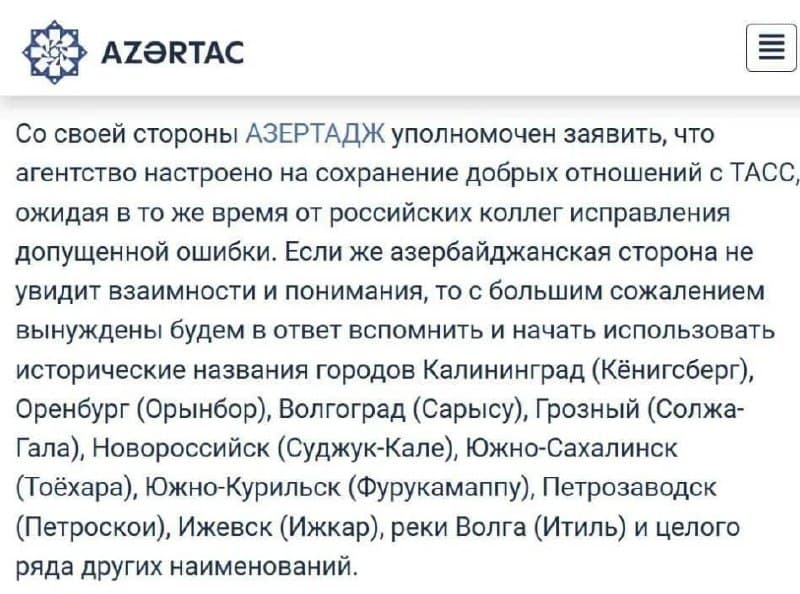Azerbaijan Proposes Renaming Russian Cities, Reviving Historical Identities Amid Tensions
In a bold move that has stirred controversy and debate, Azerbaijan"s state news agency, AZERTAC, announced plans to rename several Russian cities using their historical names. This initiative includes referring to Kaliningrad as "Königsberg," Grozny as "Solzha-Gala," and Volgograd as "Sarysu," among others. The proposal reflects a growing trend of cultural reclamation in the context of rising geopolitical tensions between Azerbaijan and Russia.
Background & Context
The renaming proposal comes at a time when Azerbaijan is navigating complex relationships with its neighbors, particularly following the recent resurgence of conflicts in the South Caucasus region. The historical names suggested by AZERTAC not only carry cultural significance but also highlight the long-standing historical narratives that have shaped the identities of these cities before they were renamed during or after the Soviet era. The city of Königsberg, for instance, was the capital of East Prussia and is historically significant to both German and Russian identities.
This move is seen as part of Azerbaijan"s broader strategy to assert its cultural heritage and national identity, especially in the face of ongoing tensions with Russia. The historical context of these names evokes a sense of pride for many Azerbaijanis and serves as a reminder of the region"s complex past, where borders and identities have often been contested.
Key Developments
AZERTAC"s announcement has sparked a wave of reactions from various stakeholders, including historians, political analysts, and citizens. While some view the renaming as a necessary step in reclaiming cultural heritage, others argue that it could further exacerbate tensions in an already fraught geopolitical landscape. The proposal has been met with particular scrutiny given the historical sensitivities surrounding these cities and their names.
Experts have pointed out that renaming cities is not merely a symbolic act; it can have real implications for diplomatic relations and regional stability. The suggestion to revert to historical names may be viewed by Russia as a provocation, especially considering the ongoing conflict in Ukraine and the broader implications of national identity in post-Soviet states. This situation mirrors other recent developments in the region, such as Trump"s orders for military deployments amid rising tensions, highlighting the precarious balance of power in Eastern Europe and beyond.
Broader Impact
The implications of Azerbaijan"s renaming initiative extend beyond cultural reclamation. It underscores the intricate relationship between history and national identity, especially in post-Soviet spaces where historical narratives are often contested. By proposing these changes, Azerbaijan may be attempting to solidify its national narrative in the context of a region that has seen significant shifts in power dynamics.
Furthermore, this move can be viewed as part of a larger trend of countries revisiting and reclaiming historical identities in response to contemporary political challenges. The act of renaming could resonate with other nations facing similar dilemmas, potentially inspiring them to reassess their historical narratives and identities. As previously reported, similar situations have unfolded in various parts of the world, where historical grievances play a role in shaping modern political landscapes.
What"s Next
The future of this renaming proposal remains uncertain as Azerbaijan navigates its diplomatic relations with Russia and other neighboring countries. Observers are keen to see how Russia will respond to this initiative, particularly in light of its historical claims over these territories. Should tensions escalate, the renaming could serve as a flashpoint for further conflict.
Moreover, the reaction from the international community will be pivotal. As geopolitical dynamics continue to evolve, Azerbaijan"s cultural reclamation efforts may influence its relationships with other nations, particularly those in the West, who may view these actions through the lens of historical justice and national sovereignty. The ongoing dialogues about identity and history in the region will likely shape the narrative as Azerbaijan moves forward with its plans.







![[Video] Gunfire between Iraqi security forces and Sadr militias in Baghdad](/_next/image?url=%2Fapi%2Fimage%2Fthumbnails%2Fthumbnail-1768343508874-4redb-thumbnail.jpg&w=3840&q=75)
